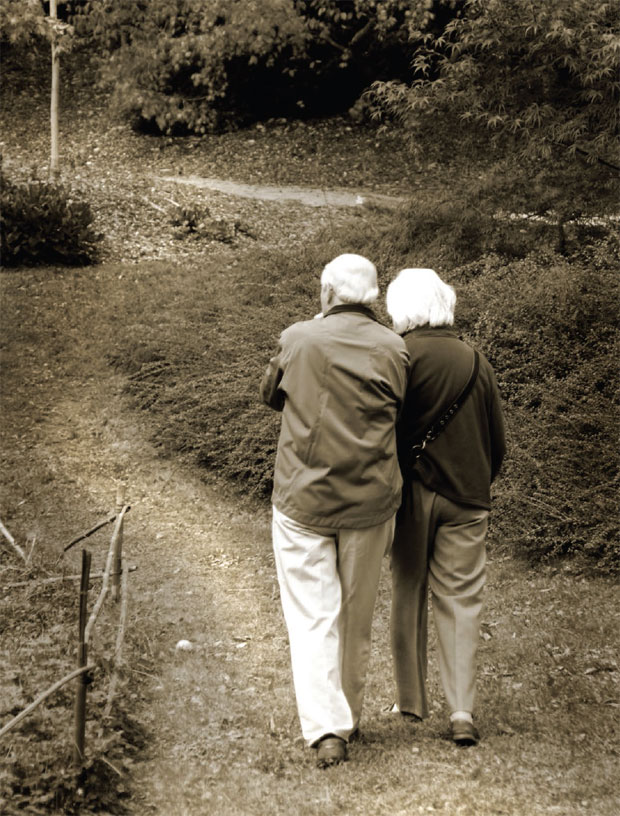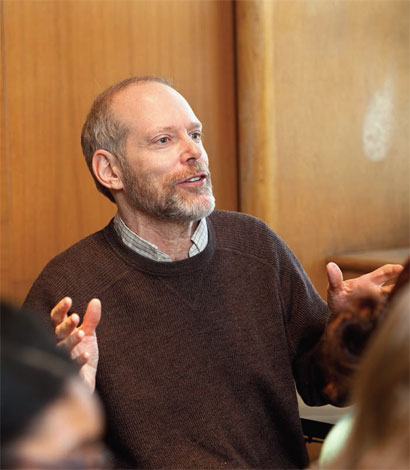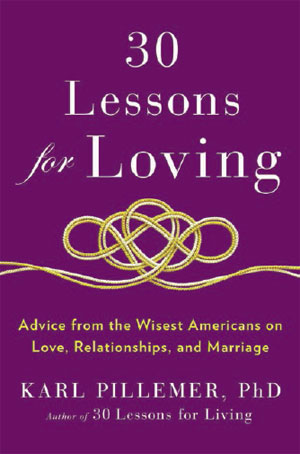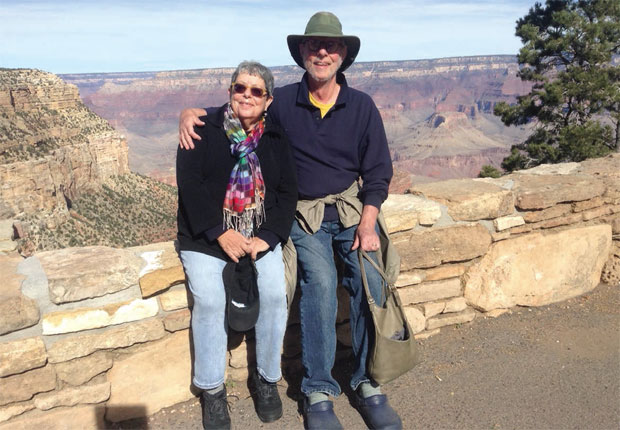Jennifer Thomas Birckmayer, MA ’56, was married to her husband for forty-seven years before he passed away in 2003. Theirs was a partnership built on deep love and commitment— the kind of relationship that many would envy. Even though it has been more than a decade since he died, Birckmayer still calls her husband—Harold Birckmayer ’52, MBA ’56, who always went by Peter—her best friend.
Yet Birckmayer, now eighty-two, doesn’t look back on her marriage through rose-colored glasses. Along with the joy, she remembers the rough patches, as she and Peter struggled with many of the troubles that long-term couples face. During their years together, they coped with the deaths of her sister and their parents. They confronted financial woes when Peter once lost his job and, as she describes it, they were “dirt poor” with four young children to support. There was plenty of stress as they juggled family and work, particularly since Birckmayer—an early childhood educator who worked as a senior extension associate for Cornell’s Department of Human Development—often had to attend meetings in Ithaca, more than three hours away from their home in Kinderhook, New York. They had serious health issues, too: Peter suffered from asthma, while Birckmayer twice battled breast cancer.
 And, of course, there was the day-to-day strain of simply living together, dealing with each other’s quirks and quibbling over household chores. She admits that there were times when they could have given up on their marriage—and she’s extremely glad they didn’t. “After the initial ‘Isn’t it wonderful to be together,’ it settles down to being a lot of hard work,” she says. “I don’t think either of us had any idea of how hard it was going to be, and how many down spots there would be in it.” But, Birckmayer adds, “those occasional moments of deep connection and extraordinary intimacy are just so stunning that I can’t imagine having them with anybody other than my husband. They make all of it worthwhile.”
And, of course, there was the day-to-day strain of simply living together, dealing with each other’s quirks and quibbling over household chores. She admits that there were times when they could have given up on their marriage—and she’s extremely glad they didn’t. “After the initial ‘Isn’t it wonderful to be together,’ it settles down to being a lot of hard work,” she says. “I don’t think either of us had any idea of how hard it was going to be, and how many down spots there would be in it.” But, Birckmayer adds, “those occasional moments of deep connection and extraordinary intimacy are just so stunning that I can’t imagine having them with anybody other than my husband. They make all of it worthwhile.”
That kind of sage observation can only come from someone with a stockpile of life experience—and it’s why human development professor Karl Pillemer turned to older Americans for relationship advice. Birckmayer is one of more than 700 people over sixty-five whom Pillemer and his research team interviewed for his latest book, 30 Lessons for Loving: Advice from the Wisest Americans on Love, Relationships, and Marriage, which comes out in January from Hudson Street Press.

Marriage minded: Pillemer interviewed couples who had been wed as long as seventy-six years. (Photo: UP)
Pillemer believes that these elders, with more than a half-century of romantic hits and misses behind them, can teach the young a lot about navigating love’s unpredictable waters. The result is a guidebook filled with no-nonsense suggestions for those who want to get married—and stay that way. The perspective of older folks is invaluable, he explains, because their viewpoint is from the end of life. “They’re looking back from the finish line; it’s no longer a mystery how things are going to turn out,” says Pillemer, who also holds an appointment in gerontology at the Medical College. “These are people who’ve been through just about everything that keeps young people awake at night, and they’re still doing okay. They’re living examples that a lot of what we worry about is actually resolvable—that with resilience, drive, and flexibility, you can still be happy, even though bad things sometimes happen to you.”
Pillemer used social science research methods to conduct the largest in-depth study ever done on longterm couples, representing a diversity of race, ethnicity, and sexual orientation. The average length of marriages was forty-three years, with the longest being a hundred-year-old woman married to her ninety-eightyear- old husband for seventy-six years. But Pillemer— who himself has been married for nearly four decades—didn’t just include examples of marital success. He also interviewed people who were in unhappy marriages, or who were single after several divorces. “I know personally that I learn as much from my mistakes and failures as things I’ve done well,” he says. “So I wanted to make sure this was not biased in favor of couples who made it to sixty years and enjoyed the whole ride.”
From this collection of stories—which required poring over hundreds of interviews and thousands of pages of transcripts— Pillemer was able to pick out a set of common teachings for dealing with married life, such as how to communicate with your partner, how to manage stressful situations, and how to keep the spark alive over the years. He also found that these older experts were able to address a vital question that many singletons have: how do I know if I’m marrying the right person?

The elders in the book acknowledge that choosing a proper mate is ultimately a guessing game. However, they offer concrete strategies on how to make that guess more educated—and some of their recommendations amazed Pillemer. “There’s this strong feeling in this country that opposites attract, and that you can’t be too similar to somebody else or it’ll get boring,” he says. “But if you ask the oldest Americans which is true—’birds of a feather’ or ‘opposites attract’—they’re totally with birds of a feather.”
Indeed, Pillemer’s subjects are united on this point; they say that you have a better shot at a good marriage if both partners share core values. The elders noted that different interests can sometimes jazz up a relationship, but couples need to be on the same page when it comes to major issues like money, parenthood, career, and religion.
That’s part of what has kept Bob and Edith Levine of Teaneck, New Jersey, together for sixty-four years. Now eighty-nine and eighty-six, respectively—and the proud parents and grandparents of Cornellians—they grew up in the same Bronx neighborhood and both are from close-knit, supportive Jewish families. The pair has the same taste in music, movies, and theatre— they’re Broadway aficionados—and neither is particularly materialistic. “We enjoy the basics in life,” says Bob. “We didn’t live above our means, and I think that comes out of having a similar background.” The Levines agreed, too, on how to raise their two daughters, especially when it came to the importance of higher education. Their younger daughter, Jane Powers, PhD ’85, is a project leader in Cornell’s Bronfenbrenner Center for Translational Research, and three of their grandchildren attended, or currently attend, the University.
The couple also illustrates another lesson that Pillemer gleaned from his research: relationships are a team effort. Bob says his approach to marriage was greatly influenced by his military service during World War II; he lost a leg at Normandy and spent time in a German prisoner of war camp. That harrowing experience showed him that working together can literally mean the difference between life and death, and once he and Edith tied the knot, they resolved to overcome any obstacle as a couple. For instance, in the Seventies, Bob, who ran several Arby’s franchises, was forced to shutter his restaurants when the fast-food chain declared bankruptcy. So for a time, Edith supported the family on her salary as a schoolteacher. They managed to squeak by, though they came close to losing their house. “It was important to sit down and work out what we were going to do together,” says Bob. “It was hard, but we got through it. That’s the secret: marriage is basically a partnership.”
Another tip that Pillemer didn’t expect from the elders he interviewed: go to therapy if you need it. “They talk a lot about the importance of communication, which was really surprising from this group, who weren’t raised in our psychologized society,” he says.
For Joan Jacobs Brumberg and her husband of forty-two years, David Brumberg, counseling was key in getting them through hard times. “It wasn’t over things that involved loyalty,” explains Joan, an emerita professor of history, human development, and gender studies at Cornell. “There was no adultery or dishonesty. It was just stressful situations.” Adds David, a former history bibliographer at Olin Library: “I grew up in a situation where people did not talk a lot about emotional things, so it’s a little more difficult for me than it is for Joan. Sometimes it takes time—and help—to figure out how you want to communicate.”

Long and winding road: Joan Jacobs Brumberg and her husband, David, say that traveling together (such as this recent trip to the Grand Canyon) is one of the pleasures of an enduring partnership. (Photo provided)
And while the elders in Pillemer’s book urge couples to treat marriage as a lifetime commitment—they swear by the adage “try, try again” before splitting up—they understand that some relationships need to end. Both Brumbergs were divorced when they met, with Joan’s first marriage lasting only four years. She wed straight out of college, when she was just twentyone. Joan says she was shocked by how little she knew about her ex-husband, in spite of having dated him since she was fifteen. “The problems were everything from money to social behavior to drug use,” she says. “He got and lost a lot of professional jobs. I was the steady one.” When Joan finally decided to leave, it was 1970—and she was the only divorced person she knew at the time. Looking back, she says she probably wouldn’t have gotten married if she’d lived with her husband first, something that was taboo at the time. “My take on cohabiting is that it’s a good thing,” she says. “I think there would have been a lot fewer divorces if more people had done that.”
The Brumbergs embody another piece of advice from the book as well; they value friendship as much as love. The two agree that there needs to be more than physical attraction to sustain a long-term marriage. For Joan and David, that means knowing how to have fun together, whether it’s discussing politics, sharing a good meal, or playing with their grandchildren. “There’s a time when the initial erotic stuff passes; somebody gets sick or you just plain age,” says Joan. “So it’s nice to share your house and your bed with someone whom you basically like.”
Gathering advice from older people has been something of a lifelong activity for Pillemer. His grandmother, Katherine, was an early source of inspiration; she moved in with Pillemer’s family when he was three, after his father passed away and his mother was left to raise four boys alone. “She was an admirable person who had a huge influence on my life,” he says. “She was one of those elders who was healthy until about a month before she died at ninety-three. My brothers and I all really remember these pearls of wisdom from her.”
In 2004, long after establishing himself as a gerontologist, Pillemer was asked to conduct a survey of Cornell’s Class of 1964 for its 40th Reunion. He posed this question: “What are the most important lessons you have learned since graduating?” The responses sent in were so detailed and thoughtful, Pillemer knew he had to delve further. So he launched the Legacy Project, and over the next five years, he and his researchers assembled information from about 1,200 older people from all over the country. Those tips turned into the book 30 Lessons for Living: Tried and True Advice from the Wisest Americans, which Library Journal named one of the best self-help books of 2011.
That volume motivated Pillemer to write his new book, after many readers told him that the passages about love and relationships really struck a chord. He received e-mails from couples who displayed the book at their wedding receptions; some parents handed 30 Lessons for Living to an adult child whom they thought was making a disastrous decision to walk down the aisle—with the book open to the chapter on marriage.
Pillemer thinks that these books resonate because the younger generation is anxious about aging—and also because few young people have older role models these days. “That’s why we have movies with Morgan Freeman and Dumbledore and Yoda,” he says. “The idea of wise elders really appeals to young people, but they feel it’s missing in their lives. And the overall viewpoint of the people I interviewed was surprisingly positive about aging. This data makes you feel better about growing old.”
 When I was a child, exchanging Valentines was a big deal. We would march down to the 5 & 10 store and purchase a package of the little messages, addressing them to each member of the class. Often we accompanied our card with a few of those nearly inedible heart-shaped candies, imprinted with “Be Mine” and “Secret Admirer.” From kindergarten on, we understood that the heart was the seat of love. No one quite knows the origins of this symbolism, but we still discuss love as a “matter of the heart,” talk about broken hearts, and describe someone as a “heartthrob.”
When I was a child, exchanging Valentines was a big deal. We would march down to the 5 & 10 store and purchase a package of the little messages, addressing them to each member of the class. Often we accompanied our card with a few of those nearly inedible heart-shaped candies, imprinted with “Be Mine” and “Secret Admirer.” From kindergarten on, we understood that the heart was the seat of love. No one quite knows the origins of this symbolism, but we still discuss love as a “matter of the heart,” talk about broken hearts, and describe someone as a “heartthrob.”
In choosing a mate, the experts use precisely this kind of language. When asked the question: “How do you know that a person is the right one for you?” I heard again and again ideas and expressions reflecting this answer:
Follow your heart.
The experts believe in love. Although one might think that some of the oldest respondents married because of family pressure, religious obligation, or social expectations, there were no differences among the age groups in the endorsement of love as the sine qua non of marriage. When I sorted through responses to the question, “What advice would you give to a younger person about choosing a mate?,” a top answer was: “Be in love.” Whether you are looking back over thirty years or seventy, the experts view profound love as the secret to choosing a mate.
But is this really a useful insight? How does that observation help someone trying to sort out complicated feelings for another person? I have to admit that recommending love as a basis for marriage in our culture is analogous to making a strong argument that the sky is blue. I needed more from the elders if they were going to help me answer the question posed to me by young working women, fraternity brothers, and singles of all ages: How do I know that this person is right for me?
I’m glad to report that with the help of the experts, I learned the secret to “following your heart.” And it’s not just an amorphous idea of being in love. Instead, when you are making the decision whether or not to go forward in a serious way, the experts told me there’s one specific thing to look for: the in-love feeling. Its presence or absence is the diagnostic tool you need to decide “should I stay or should I go?”
In the search for a partner, nearly all of the experts described a powerful “sense of rightness,” an intuitive and almost indescribable conviction that you have made the right choice. Call it what you will—a spark, an intuition, a gut feeling—but they agree that you shouldn’t commit to a relationship without it. That’s what following your heart means.
I admit that this profound sense that the person is right for you sounds intangible and even a bit mystical. And the elders often struggled to put this all-important criterion for choosing a mate into words. But for the experts, this particular ineffable feeling is highly predictive of a successful marriage. And in even stronger terms that warn you about the flip-side of the in-love feeling: Never get married without it.
Over and over, the experts described this same “in-love feeling.” Most remarkable was the nearly identical wording they employed; it varied little from person to person. When asked how they knew their partner was “the one,” they would often hunt for words, and then wind up referring to this special feeling. This sensation involves a conviction of overwhelming rightness that builds on, but ultimately defies, a solely rational explanation.
Perhaps even more important than the in-love feeling is the opposite; let’s call it the “this is wrong” feeling. Many experts also described this feeling in remarkably similar terms: as a visceral, intuitive, nagging sense that the relationship is just not right. It may be so faint that you have to search your feelings carefully for it. But the experts tell you from their own—sometimes tragic—experience that you ignore the warning of that feeling at your great peril.
In the Rodgers and Hammerstein musical South Pacific, we are offered this advice about love: “Who can explain it, who can tell you why? Fools give you reasons, wise men don’t even try.” The experts do a remarkable job of telling you how to look for love concretely, while admitting they can’t really explain it. In their long experience, being “in love” will be a different experience for each individual, and one— despite thousands of years of poetic attempts—that ultimately defies description.
EXCERPTED AND CONDENSED FROM 30 LESSONS FOR LOVING: ADVICE FROM THE WISEST AMERICANS ON LOVE, RELATIONSHIPS, AND MARRIAGE. REPRINTED BY ARRANGEMENT WITH HUDSON STREET PRESS, A MEMBER OF PENGUIN GROUP (USA) LLC, A PENGUIN RANDOM HOUSE COMPANY. COPYRIGHT © 2015 BY KARL PILLEMER, PHD.


